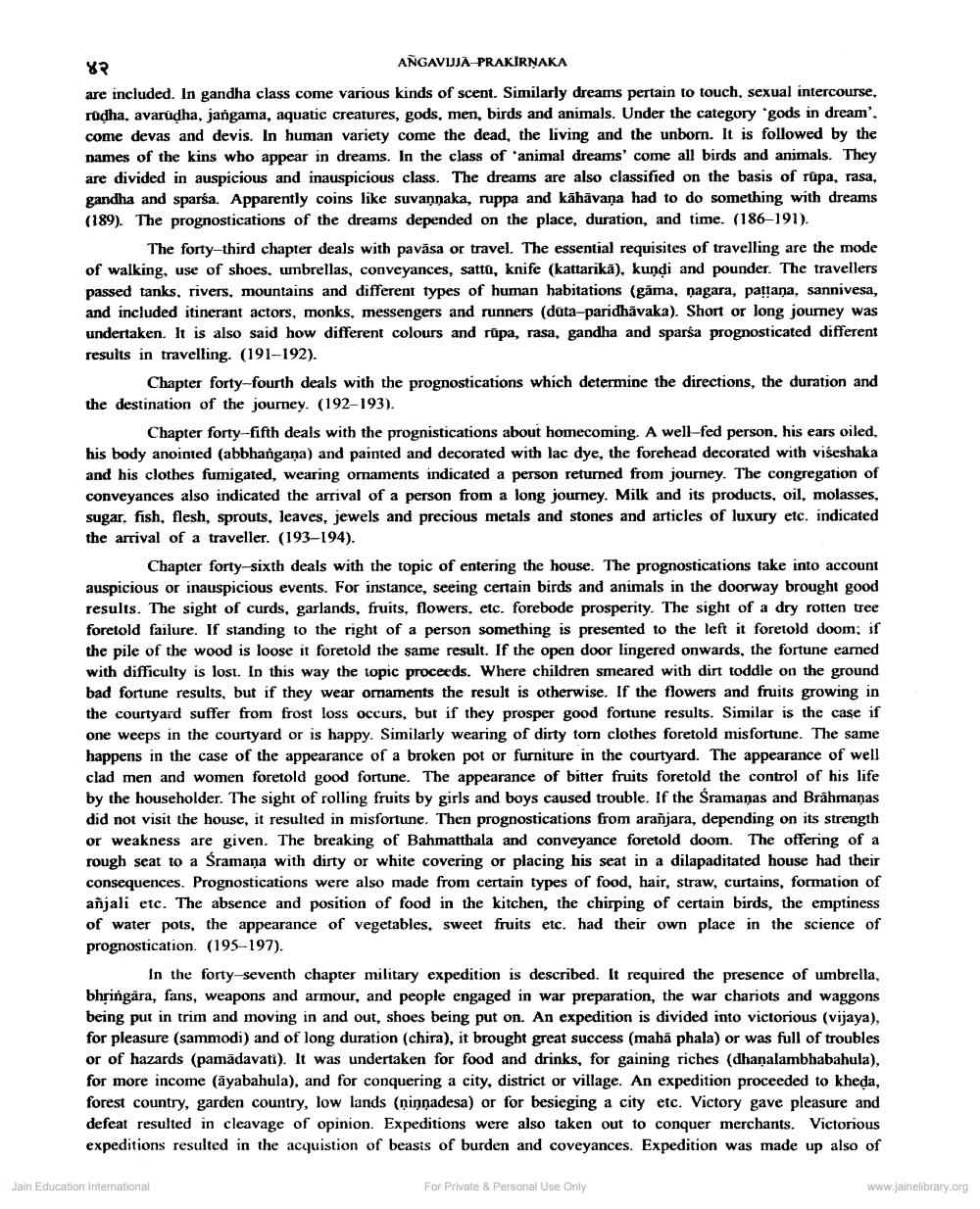________________
४२
ANGAVIJĀ PRAKIRNAKA are included. In gandha class come various kinds of scent. Similarly dreams pertain to touch, sexual intercourse, rodha, avarudha, jangama, aquatic creatures, gods, men, birds and animals. Under the category "gods in dream'. come devas and devis. In human variety come the dead, the living and the unborn. It is followed by the names of the kins who appear in dreams. In the class of 'animal dreams' come all birds and animals. They are divided in auspicious and inauspicious class. The dreams are also classified on the basis of rupa, rasa, gandha and sparsa. Apparently coins like suvannaka, ruppa and kähävana had to do something with dreams (189). The prognostications of the dreams depended on the place, duration, and time. (186-191).
The forty-third chapter deals with pavāsa or travel. The essential requisites of travelling are the mode of walking, use of shoes, umbrellas, conveyances, satta, knife (kattarikā), kundi and pounder. The travellers passed tanks, rivers, mountains and different types of human habitations (gäma, nagara, pattana, sannivesa, and included itinerant actors, monks, messengers and runners (duta-paridhävaka). Short or long journey was undertaken. It is also said how different colours and rūpa, rasa, gandha and sparśa prognosticated different results in travelling. (191-192).
Chapter forty-fourth deals with the prognostications which determine the directions, the duration and the destination of the journey. (192–193).
Chapter forty--fifth deals with the prognistications about homecoming. A well-fed person, his ears oiled, his body anointed (abbhangana) and painted and decorated with lac dye, the forehead decorated with višeshaka and his clothes fumigated, wearing ornaments indicated a person returned from journey. The congregation of conveyances also indicated the arrival of a person from a long journey. Milk and its products, oil, molasses, sugar, fish, flesh, sprouts, leaves, jewels and precious metals and stones and articles of luxury etc. indicated the arrival of a traveller. (193–194).
Chapter forty-sixth deals with the topic of entering the house. The prognostications take into account auspicious or inauspicious events. For instance, seeing certain birds and animals in the doorway brought good results. The sight of curds, garlands, fruits, flowers, etc. forebode prosperity. The sight of a dry rotten tree foretold failure. If standing to the right of a person something is presented to the left it foretold doom; if the pile of the wood is loose it foretold the same result. If the open door lingered onwards, the fortune earned with difficulty is lost. In this way the topic proceeds. Where children smeared with dirt toddle on the ground bad fortune results, but if they wear ornaments the result is otherwise. If the flowers and fruits growing in the courtyard suffer from frost loss occurs, but if they prosper good fortune results. Similar is the case if one weeps in the courtyard or is happy. Similarly wearing of dirty tom clothes foretold misfortune. The same happens in the case of the appearance of a broken pot or furniture in the courtyard. The appearance of well clad men and women foretold good fortune. The appearance of bitter fruits foretold the control of his life by the householder. The sight of rolling fruits by girls and boys caused trouble. If the Sramaņas and Brāhmaṇas did not visit the house, it resulted in misfortune. Then prognostications from arañjara, depending on its strength or weakness are given. The breaking of Bahmatthala and conveyance foretold doom. The offering of a rough seat to a Sramana with dirty or white covering or placing his seat in a dilapaditated house had their consequences. Prognostications were also made from certain types of food, hair, straw, curtains, formation of anjali etc. The absence and position of food in the kitchen, the chirping of certain birds, the emptiness of water pots, the appearance of vegetables, sweet fruits etc. had their own place in the science of prognostication. (195--197).
in the forty-seventh chapter military expedition is described. It required the presence of umbrella, bhringára, fans, weapons and armour, and people engaged in war preparation, the war chariots and waggons being put in trim and moving in and out, shoes being put on. An expedition is divided into victorious (vijaya), for pleasure (sammodi) and of long duration (chira), it brought great success (maha phala) or was full of troubles or of hazards (pamādavati). It was undertaken for food and drinks, for gaining riches (dhanalambhabahula), for more income (yabahula), and for conquering a city, district or village. An expedition proceeded to kheda, forest country, garden country, low lands (ninnadesa) or for besieging a city etc. Victory gave pleasure and defeat resulted in cleavage of opinion. Expeditions were also taken out to conquer merchants. Victorious expeditions resulted in the acquistion of beasis of burden and coveyances. Expedition was made up also of
Jain Education International
For Private & Personal Use Only
www.jainelibrary.org




